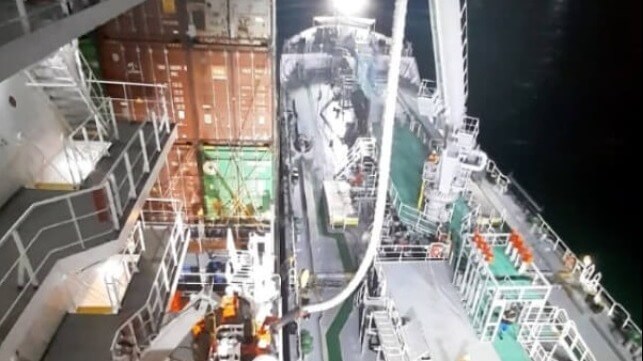Norden and ONE Proceeding with Biofuels

The shipping industry continues to explore the use of biofuel as a means of improving the environmental performance of in-service ships. Ocean Network Express (ONE) recently completed a further trial of the fuel on one of its containerships while Denmark’s Norden, one of the oldest shipping companies, announced that it is ready to begin offering customers the option for carbon-neutral freight transport using biofuel on its vessels. In addition to the sustainability, the advantage of biofuel that has been repeatedly confirmed in these trials is that it required no modifications to marine engines or fuel infrastructure when used as a fuel or as a “drop-in” to reduce emissions.
“We see biofuel as a very important transition fuel on our journey to zero-carbon shipping as it can be used onboard our current vessels to make an immediate reduction on carbon emissions,” said Henrik Røjel, Head of decarbonization at Norden.
Norden reports that it has secured a supply of biofuel made from waste cooking oil and is in discussion with several customers over the first carbon-neutral freight contract. The company aims to scale up its biofuel offering as global production becomes more advanced, and biofuels can be developed from new alternative sources.
“We believe there is a growing demand for carbon-neutral transportation from our customers – particularly those with ambitious sustainability goals,” said Adam Nielsen, Head of Logistics and Climate Solutions for Norden. “We are ready to support those customers that wish to take the leap to an environmentally-friendly form of freight transport.”
At the same time, container shipping company ONE reports it completed its third trial of marine biofuel. They loaded 1,300 metric tonnes of marine biofuel product during bunkering at the Port of Singapore, on February 11, 2022, aboard the NYK Fuji, an 11-year-old 52,000 dwt containership. The trial started on February 21, 2022, after the vessel passed the Malacca Straits, sailing onwards to the ports of Durban and Cape Town, before returning to Southeast Asia on its 45-day voyage.
The biofuel product used was a blend of Brown Grease Methyl Ester (BGME), a type of Fatty Acid Methyl Ester (FAME), with Very Low Sulphur Fuel Oil (VLSFO). The BGME is produced from feedstocks labeled as 100 percent waste or residue and is certified for its sustainability to internationally recognized standards. It is a sustainable biofuel component that is technically and operationally similar to petroleum-derived marine fuels. The blend of BGME with VLSFO was supplied by bp.

that matters most
Get the latest maritime news delivered to your inbox daily.
According to ONE, this latest biofuel trial once again proves the potential to expand the use of sustainable biofuel components and marks yet another step forward for the company’s sustainability initiatives.
ONE conducted its first test of biofuels following bunkering by GoodFuels at the port of Rotterdam in November 2020 aboard the MOL Experience. During this first trial, the sustainable biofuel was blended with conventional fossil fuels used aboard the 15-year-old vessel during its Atlantic crossings between Europe and the U.S. During the second test also aboard the same vessel using the biofuel for a 36-day trial period in March and April 2021. The specifications of the second trial were different from the first trial, with the mixing ratio three times higher in biofuel content.
